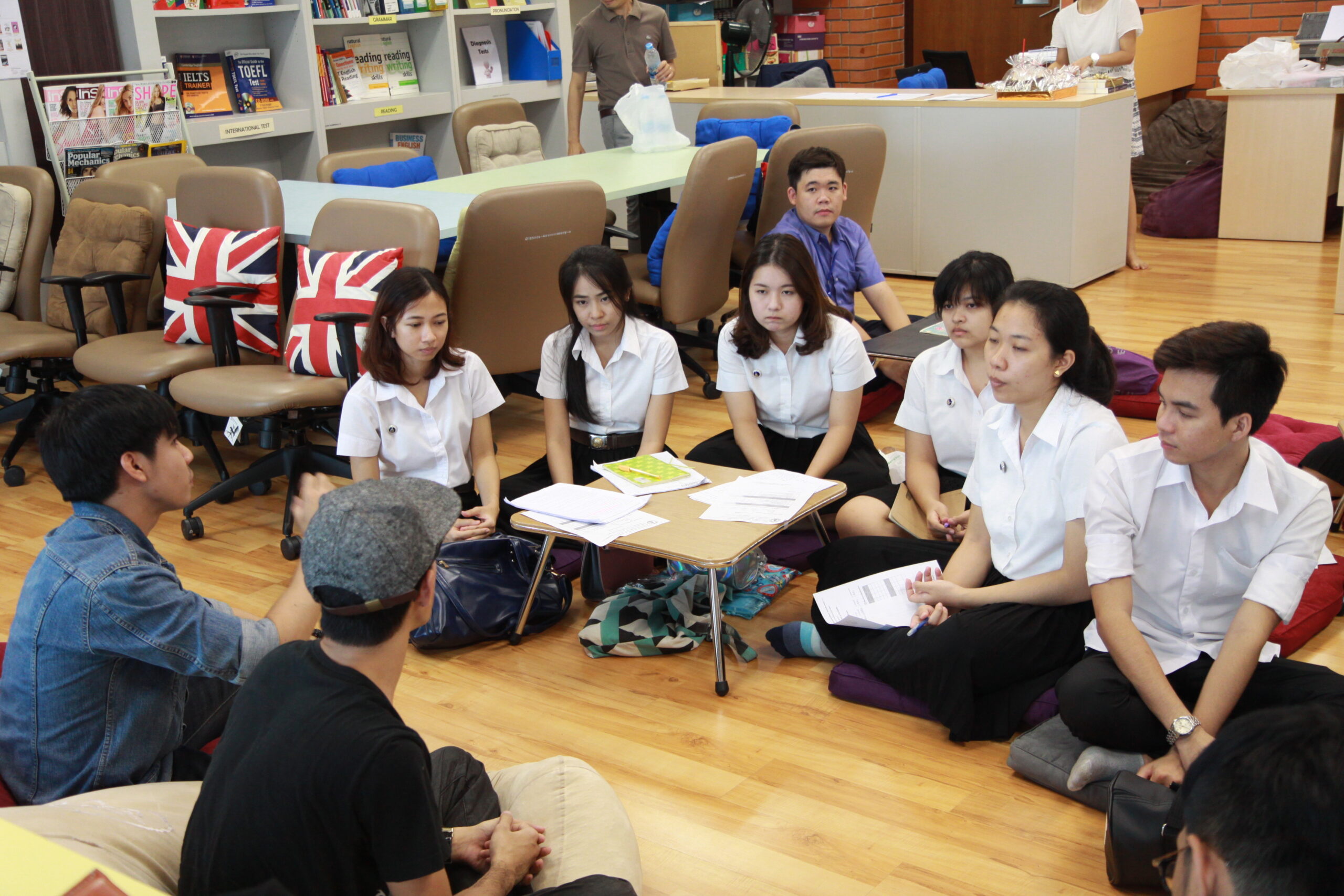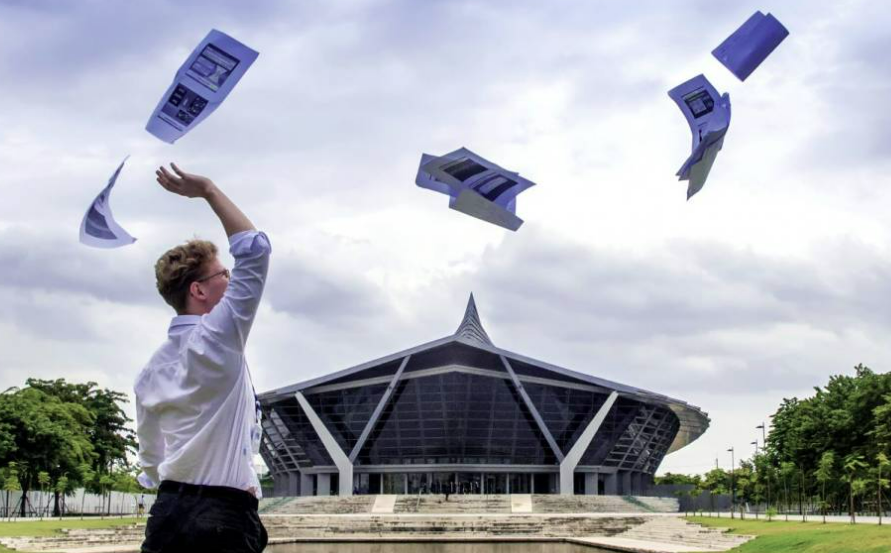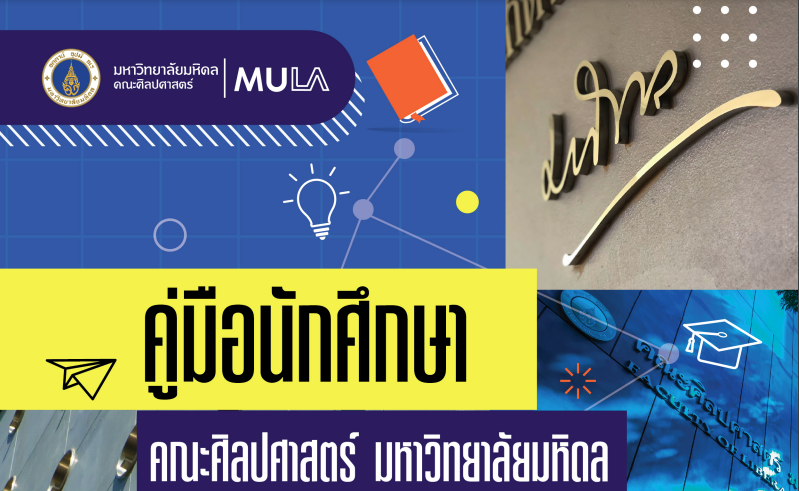Bachelor of Arts Program in Chinese
Program in Chinese (International Program)
- Bachelor’s Degree Program
- Strength of the Program
- General Information of the Program
- Specific Information of the Program
- Graduates’ Advancement
- Educational Philosophy in Program Administration
- Competences Provided to the Students
- Graduates’ Learning Outcomes
- TQF. 2
- Q&A
Program Title
Bachelor of Arts Program in Chinese (International Program)
Degree Offered
Bachelor of Arts (Chinese)
- The Program offers 3 study plans for students to choose depending on their interests.
- The Program offers the courses focusing on developing the Chinese language at a high level and up-to-date that students can apply in their real-life careers. Some of these courses are Chinese Translation, Chinese Interpretation, Chinese Online Business, Chinese International Trading, and Teaching Chinese Language as a Foreign Language.
- The course that shows the identity of Mahidol University is Chinese for Medical Personnel.
- The Program requires 180 scores of HSK6 or equivalent as the requirement for graduation.
Type of the Program
Bachelor’s Degree (International Program)
Academic Program
Total Credits Required
No fewer than 146 credits
Studying Duration/Program Cycle
4-Year Program
The Program Status and Opening Schedule
New Program and the Program will be started in Semester 1 of Academic Year 2021 (August 2021)
Degree Granting
Plan A – One Degree of Chinese Major
Plan B1 – Double Degree of Chinese Major and Chinese Language and Culture Major
Plan B2 – Double Degree of Chinese Major and Business Chinese Major
Degree-Granting Institutions (MOU with other Institutions)
Plan A – Mahidol University
Plan B1 and B2 – Mahidol University and Shanghai Jiao Tong University, PRC (MOU with the School of Humanities, Shanghai Jiao Tong University)
Purpose / Goals / Objectives
Goals: The program focuses on developing globally-competent graduates who possess both knowledge and practical skills in Chinese and are ready to work or further their study. The graduates are expected to acquire MU graduate attributes as well.
Objectives: This program aims to produce graduates who have the characteristics, knowledge, skills, and attributes as follows:
- have basic moral and ethics including following rules and regulations of community, having self and social responsibility
- can integrate and apply Chinese language and Chinese studies knowledge in different situations effectively and appropriately
- have high level of skills for Chinese communication through listening, speaking, reading, writing, and translating.
- can communicate in English through listening, speaking, reading, and writing effectively
- have analytical, critical, and creative thinking skills
- have a lifelong learning skill
- can display leadership and teamwork skills to complete assigned tasks
- can apply information technology knowledge to acquire knowledge and analyze data
Distinctive Features
- Students have opportunity for choosing a study plan of double degree through study abroad for 2 academic years at Shanghai Jiao Tong University.
- Students will have opportunity to study with Chinese professors come from Shanghai Jiao Tong university or Beijing Language and Culture University under our MOUs.
- HSK6 (Hanyu Shuiping Kaoshi Level 6) or equivalent is a graduation requirement of this program.
Educational System
Semester System; Classroom Mode
Career Opportunities
- Translator and interpreter
- Staff in international organizations such as United Nation, Ministry of Foreign Affairs, embassy, consulate, etc.
- Staff in tourism business, hotel business, airline business, and other service business
- Freelancer or officer in a company related to businesses in China or in other countries using Chinese for communication
Further Field of Study
Graduate program in Chinese, Chinese Studies, Linguistics, Applied Linguistics, Education, Teaching Chinese as a Foreign Language (TCFL), Translation and Interpretation, etc.
Educational Philosophy
In order to develop students to become wisdom graduates, this program focuses on educating the students to achieve the program expected learning outcomes based on outcome-based education, which all learning outcomes can be achieved through learning-centered approach and constructivism theory. The graduates’ characteristics will be aligned with the National TQF Graduates Competencies and MU Graduate Attributes as well.
Strategy/Teaching Guidelines
The program always realize the differences of students’ background, interests, and learning styles, Therefore, the diverse learning approaches and activities are set for enhancing them to achieve the program learning outcomes. Those are interactive lectures, demonstration, role playing, self-directed learning, project- based learning, problem-based learning, individual and group discussion, and individual and group assignments.
Strategy/Student’s Evaluation Guidelines
- The assessments and evaluations are designed from the alignment with teaching strategies, course learning outcomes, and program learning outcomes, including formative assessment and summative assessment by using a variety of methods and tools such as written and oral examination, practical test, oral presentation, assignment report, portfolio, project report, self–evaluation andreflection, peer assessment and behavior observation. Student self– Based on course learning outcomes, rubrics will be designed and will be used to score the students’ achievement. Those rubrics will be identified and explained to the students clearly in the first day of every course.
- A standardize test will be used to evaluate the students learning outcomes for each academic year.
Generic Competences
- Demonstrate moral and ethical behavior, respect rules and regulations of community, take responsibility in their own action, and be aware of plagiarism
- Perform the analytical and critical thinking skills for evaluating related information and problems logically and systematically
- Perform the creative thinking skill through generating new ideas in different perspective to offer new solutions or solve problems
- Apply lifelong learning skill for acquiring knowledge and developing new skills
- Apply an appropriate English form to communicate with target audience in academic context
- Demonstrate leadership skill to work with team appropriately and accept other people’s differences
- Apply appropriate information technology to acquire knowledge from various sources and analyze data reliably
Subject-specific Competences
- Demonstrate deep and broad knowledge in Chinese language and Chinese studies (including Chinese language, literature, culture, society, and history)
- Perform the high level of skills in applying Chinese language for communication (listening, speaking, reading, writing, and translating) in the different situations correctly and appropriately
- Be aware the code of ethics for translating and interpreting professionals
- Create and conduct term paper on a Chinese topic
PLOs
PLO1: Communicate in the high level at HSK level 6 or equivalent of Chinese with target audience correctly, appropriately and ethically in each situation
PLO2: Evaluate knowledge and information in terms of Chinese language and culture critically and ethically
PLO3: Express academic opinion about Chinese and China in English to target audience clearly and purposefully
PLO4: Create and construct an argument about current Chinese issues effectively
PLO5: Complete a term paper in Chinese on a topic of Chinese systematically and ethically
PLO6: Work individually with responsibilities and ethics consistently
PLO7: Cooperate with others to achieve team goals based on situations and roles effectively
- ถาม: หลักสูตรนี้มีความแตกต่างจากหลักสูตรภาษาจีนของสถาบันอื่นอย่างไร
- คำตอบ: หลักสูตรนี้มีความแตกต่างจากหลักสูตรภาษาจีนของสถาบันอื่น ดังนี้
เป็นหลักสูตรนานาชาติที่จัดการเรียนการสอนโดยใช้ภาษาจีนและภาษาอังกฤษ และมีแผนการศึกษาให้เลือกเรียนได้ตามความสนใจและความสามารถ 3 แผนการศึกษา หลักสูตรมีรายวิชาที่เน้นการฝึกทักษะภาษาจีนระดับสูง รายวิชามีความทันสมัย สามารถตอบโจทย์การทำงานในอนาคตได้จริง เช่น วิชาการแปลภาษาจีน การแปลล่ามภาษาจีน ภาษาจีนในธุรกิจออนไลน์ ภาษาจีนสำหรับการค้าระหว่างประเทศ การสอนภาษาจีนในฐานะภาษาต่างประเทศ เป็นต้น นอกจากนี้ยังมีวิชาที่แสดงอัตลักษณ์ของความเป็นมหาวิทยาลัยมหิดลด้วย ก็คือ วิชาภาษาจีนสำหรับบุคลากรทางการแพทย์หลักสูตรกำหนดให้ HSK6 หรือเทียบเท่าเป็นเงื่อนไขของการจบการศึกษาของหลักสูตรนี้ ซึ่งเป็นการแสดงมาตรฐานของบัณฑิตในด้านทักษะภาษาจีนระดับสูง และมีความพร้อมที่จะศึกษาต่อในประเทศจีนหรือในสถาบันที่กำหนดให้ยื่นคะแนน HSK
- ถาม: หลักสูตรนี้เรียนอะไรบ้าง
- คำตอบ: หลักสูตรฯ ภาษาจีน นอกจากจะเรียนรายวิชาที่พัฒนาทักษะการฟัง การพูด การอ่าน การเขียน และการแปลภาษาจีนแล้ว นักศึกษายังได้เรียนรายวิชาที่เกี่ยวข้องกับสังคม วัฒนธรรม เศรษฐกิจ การเมืองการปกครอง ประวัติศาสตร์ ปรัชญา วรรณคดี และภูมิปัญญาของจีน ซึ่งจะทำให้นักศึกษามีความรู้ที่ครอบคลุมครบถ้วน ทำให้เข้าใจบริบทและมิติต่างๆ ของจีน และส่งผลให้สามารถใช้ภาษาจีนได้อย่างมีประสิทธิภาพยิ่งขึ้น นอกจากรายวิชาที่เกี่ยวข้องกับภาษาจีนและจีนศึกษาแล้ว นักศึกษาจำเป็นต้องเรียนรายวิชาในหมวดวิชาศึกษาทั่วไป ซึ่งเป็นกลุ่มวิชาที่ช่วยเสริมสร้างสมรรถนะที่จำเป็นต่อการทำงานหรือศึกษาต่อในอนาคต อันประกอบด้วย วิชาภาษาอังกฤษ วิชาในกลุ่มมนุษยศาสตร์และสังคมศาสตร์ วิทยาศาสตร์และคณิตศาสตร์ ตลอดจนวิชาในกลุ่มสุขภาพและนัทนาการ และหากนักศึกษามีความสนใจที่จะเรียนรายวิชาใดๆ นอกหลักสูตร ก็สามารถเลือกเรียนได้ตามความสนใน ในฐานะวิชาเลือกเสรีได้ด้วย
- ถาม: หลักสูตรนี้มีแผนการศึกษาทั้งหมดกี่แผน อย่างไรบ้าง
- คำตอบ: มี 3 แผนการศึกษา ได้แก่
แผนการศึกษาที่ 1 หรือ Plan A เรียนที่คณะศิลปศาสตร์ มหาวิทยาลัยมหิดล เป็นเวลา 4 ปี ได้รับปริญญา 1 ใบ คือ B.A. in Chinese จากมหาวิทยาลัยมหิดล
แผนการศึกษาที่ 2 หรือ Plan B1 เรียนที่คณะศิลปศาสตร์ มหาวิทยาลัยมหิดล เป็นเวลา 2 ปี คือชั้นปีที่ 1 และชั้นปีที่ 4 อีก 2 ปี คือชั้นปีที่ 2 และชั้นปีที่ 3 ไปเรียนที่ Shanghai Jiao Tong University ผู้ที่เลือกเรียน Plan B1 จะได้รับ 2 ปริญญา คือ B.A. in Chinese จากมหาวิทยาลัยมหิดล และ B.A. in Chinese Language and Culture จาก Shanghai Jiao Tong University
แผนการศึกษาที่ 3 หรือ Plan B2 เรียนที่คณะศิลปศาสตร์ มหาวิทยาลัยมหิดล เป็นเวลา 2 ปี คือชั้นปีที่ 1 และชั้นปีที่ 4 อีก 2 ปี คือชั้นปีที่ 2 และชั้นปีที่ 3 ไปเรียนที่ Shanghai Jiao Tong Universityผู้ที่เลือกเรียน Plan B2 จะได้รับ 2 ปริญญา คือ B.A. in Chinese จากมหาวิทยาลัยมหิดล และ B.A. in Business Chinese จาก Shanghai Jiao Tong University
- ถาม: หลักสูตรมีระยะเวลาการศึกษาตลอดหลักสูตรกี่ปี
- คำตอบ: หลักสูตรนี้เป็นหลักสูตร 4 ปี ทั้ง 3 แผนการศึกษา
- ถาม: หลักสูตรนี้จัดการเรียนการสอนเป็นภาษาอะไร
- คำตอบ:หลักสูตรนี้เป็นหลักสูตรภาษาจีน ซึ่งถือว่าเป็นหนึ่งในภาษาต่างประเทศ การพัฒนาทักษะจึงจำเป็นต้องอาศัยเจ้าของภาษา เพราะฉะนั้นนักศึกษาจะได้เรียนกับเจ้าของภาษาก็คือชาวจีนทุกภาคการศึกษาอย่างแน่นอน ไม่ว่านักศึกษาจะเลือกเรียนแผนการศึกษาใด เนื่องจากหลักสูตรมีผู้เชี่ยวชาญชาวจีนประจำอยู่ และหลักสูตรยังมีความร่วมมือกับ Shanghai Jiao Tong University และ Beijing Language and Culture University ในของการแลกเปลี่ยนอาจารย์เพื่อมาจัดการเรียนการสอนภาษาจีนอย่างต่อเนื่อง ส่วนแผนการศึกษา B1 และ B2 ซึ่งนักศึกษาจะต้องไปเรียนที่ SJTU เป็นเวลา 2 ปี คือ ชั้นปีที่ 2-3 นักศึกษาจะได้เรียนกับเจ้าของภาษาทุกรายวิชา และได้มีโอกาสใช้ชีวิตท่ามกลางสิ่งแวดล้อมที่เอื้อต่อการพัฒนาภาษาจีนและได้สัมผัสวัฒนธรรมจีนมากยิ่งขึ้นด้วย
- ถาม: นักศึกษาจะได้เรียนกับอาจารย์ที่เป็นเจ้าของภาษาหรือไม่
- คำตอบ: เนื่องจากหลักสูตรมีผู้เชี่ยวชาญชาวจีนประจำอยู่ และหลักสูตรยังมีความร่วมมือกับ Shanghai Jiao Tong University และ Beijing Language and Culture University ในการแลกเปลี่ยนอาจารย์เพื่อมาจัดการเรียนการสอนภาษาจีนอย่างต่อเนื่อง
- ถาม: หลักสูตรมีทุนแลกเปลี่ยนหรือไม่ อย่างไร
- คำตอบ: สำหรับทุนแลกเปลี่ยนที่มีจะเป็นทุนการศึกษาที่ไปแลกเปลี่ยนยังต่างประเทศ โดยแบ่งเป็น 2 ระดับ ดังนี้ทุนระดับมหาวิทยาลัย ซึ่งนักศึกษาสามารถยื่นเสนอเพื่อขอรับทุนได้ตามเงื่อนไขของประกาศมหาวิทยาลัย ได้แก่ ทุน Mobilityทุนระดับหลักสูตร เนื่องจากหลักสูตรมีความร่วมมือในการจัดหลักสูตรสองปริญญากับ Shanghai Jiao Tong University ดังนั้น ทาง SJTU จึงเสนอให้ทุนการศึกษาสำหรับนักศึกษาในแผน B1 และ B2 ที่มีผลการเรียนดีและเป็นไปตามเงื่อนไข โดยจะให้ทุนขณะที่เรียนอยู่ที่ SJTU
- ถาม: หลักสูตรมีแนวทางการดูแลนักศึกษาที่ต้องไปอยู่ต่างประเทศอย่างไร อาทิเช่น เรื่องที่พักและความเป็นอยู่ของนักศึกษา
- คำตอบ: สำหรับนักศึกษาที่ไปศึกษาต่อที่ Shanghai Jiao Tong University เป็นเวลา 2 ปี (นักศึกษาที่เลือกแผนการศึกษา B1 และแผนการศึกษา B2) ทาง SJTU จะมีหน่วยงานที่ดูแลนักศึกษาต่างชาติโดยเฉพาะ ชื่อว่า International Students Center ซึ่งจะมีผู้ที่ได้รับการมอบหมายให้ดูแลนักศึกษาต่างชาติ รวมถึงมีอาจารย์ที่ปรึกษาที่จะคอยดูแลเรื่องความเป็นอยู่ให้กับนักศึกษาโดยเฉพาะ
สำหรับหอพัก เนื่องจาก SJTU มีจำนวนหอพักภายในมหาวิทยาลัยที่จำกัด อย่างไรก็ตาม SJTU มีหอพักที่เป็นคู่ความร่วมมืออยู่หลายแห่ง ซึ่งเป็นหอพักที่อยู่ภายใต้การกำกับดูแลของมหาวิทยาลัย มีความปลอดภัยสูง สามารถเดินทางโดยใช้รถไฟใต้ดินหรือรถโดยสารประจำทางได้อย่างสะดวก ใช้เวลาประมาณไม่เกิน 15 นาทีจากที่พักจนมาถึงมหาวิทยาลัย
- ถาม: หากเลือกไปเรียนที่ Shanghai Jiao Tong University แล้วเกิดปัญหาที่ทำให้เรียนที่นั่นต่อไปไม่ได้ หลักสูตรจะมีทางออกให้นักศึกษาอย่างไร
- คำตอบ: กรณีที่นักศึกษาใน Plan B1 และ B2 ไม่สามารถเรียนที่ Shanghai Jiao Tong University ได้จนครบกำหนดเวลา 2 ปีนั้น นักศึกษาสามารถเทียบโอนรายวิชาขณะที่เรียนที่ SJTU และย้ายแผนการศึกษากลับมา Plan A ได้ โดยรายวิชาที่ขอเทียบโอนจะต้องเป็นรายวิชาที่หลักสูตรทำการเทียบเคียงไว้แล้วและนักศึกษามีผลประเมินจาก SJTU เรียบร้อยแล้ว ทั้งนี้การเทียบโอนรายวิชาและการเปลี่ยนแผนการศึกษาต้องผ่านการพิจารณาจากกรรมการบริหารหลักสูตรด้วย
- ถาม: หลักสูตรมีการฝึกงานหรือไม่ ที่ไหนบ้าง
- ตอบ: ในหลักสูตรนี้ยังไม่มีวิชาฝึกงาน เนื่องจากจำนวนหน่วยกิต และจำนวนรายวิชาตามโครงสร้าง ก็มีจำนวนมากพอสมควรแล้ว ทั้งนี้หากนักศึกษามีความประสงค์หรือสนใจที่จะฝึกงานในหน่วยงานที่นักศึกษาอยากจะเข้าไปศึกษาระบบการทำงานหรือได้รับประสบการณ์ ทางคณะศิลปศาสตร์สามารถออกหนังสือให้นักศึกษานำไปใช้ในการติดต่อเพื่อขอเข้าฝึกงานตามหน่วยงานต่าง ๆ ได้ รวมทั้งคณะศิลปศาสตร์เองก็มีข้อตกลงความร่วมมือกับหน่วยงานที่มีชื่อเสียงหลายหน่วยงาน ซึ่งผู้ที่สนใจสามารถติดต่อทางหน่วยกิจการนักศึกษาว่าคณะฯ มีข้อตกลงความร่วมมือเรื่องการฝึกงานกับหน่วยงานใดบ้าง
- ถาม: เมื่อนักศึกษาจบการศึกษาจากหลักสูตรนี้แล้วต้องการศึกษาต่อ สามารถเข้าศึกษาต่อในสาขาใดได้บ้าง
- ตอบ: นอกจากจะศึกษาต่อในสาขาวิชาภาษาจีนแล้ว นักศึกษาสามารถเข้าศึกษาต่อในสาขาอื่นๆ ที่หลากหลายได้ สาขาใดที่ไม่ได้กำหนดคุณวุฒิระดับปริญญาตรีไว้เฉพาะเจาะจง ก็สามารถสมัครเรียนต่อได้ทั้งหมด อย่างเช่น คณะศึกษาศาสตร์ ครุศาสตร์ หรือจะเป็นหลักสูตรที่ศึกษาเกี่ยวกับการประยุกต์ใช้ภาษา เช่น หลักสูตรภาษาศาสตร์ประยุกต์ หลักสูตรภาษาศาสตร์ หลักสูตรการแปลและการล่าม วรรณคดีเปรียบเทียบ เป็นต้น ทั้งนี้หลักสูตรที่เปิดรับสมัครเข้าเรียนต่อ จะมีการระบุคุณวุฒิระดับปริญญาตรีว่าสามารถรับสมัครผู้ที่จบจากหลักสูตรใดได้บ้าง
- ถาม: เมื่อนักศึกษาจบการศึกษาแล้ว สามารถประกอบอาชีพใดได้บ้าง
- ตอบ: อาชีพที่สามารถทำได้หลังจบการศึกษา จะมีความหลากหลายขึ้นอยู่กับการประยุกต์ใช้ภาษาจีนในการทำงาน เช่น สามารถทำงานเป็นนักแปล หรือล่าม ทำงานในองค์กรหรือสถาบันระดับนานาชาติ เช่น องค์การสหประชาชาติ กระทรวงการต่างประเทศ หรือในบริษัท หรือหน่วยงานที่ต้องการผู้ที่มีความสามารถในการใช้ภาษาจีนระดับสูง ตลอดจนสามารถทำงานเป็นผู้ประกอบการอิสระที่ทำธุรกิจที่เกี่ยวข้องกับการใช้ความรู้ภาษาจีนในการประสานงาน หรือทำธุรกิจร่วมกับประเทศจีน หรือประเทศอื่น ๆ ที่ใช้ภาษาจีน เช่น อาจจะเป็นมาเลเซีย สิงคโปร์ ฮ่องกง เป็นต้น หรือใครที่ชอบสอน ก็สามารถเป็นติวเตอร์ได้ด้วย
Tuition Fee
Plan A
- Thai Student 55,000 / Semester
- Foreign Student 71,000 / Semester
- Tuition Fees / -
Total Tuition and Fees (baht)
Thai Student 440,000
Foreign Student 568,000
Plan B1/B2
- Thai Student 55,000 / Semester (1st and 4th year)
- Foreign Student 71,000 / Semester (1st and 4th year)
- Tuition Fees / 24,800 CNY/year (2nd and 3rd year)
Total Tuition and Fees (baht)
Thai Student 508,000 (approximately)
Foreign Student 572,000 (approximately)
Scholarships
- Mahidol University Scholarships
- Mahidol University Emergency Fund
- Loan for Students in Need
- Educational Loan
- Faculty of Liberal Arts Scholarships
- Faculty of Liberal Arts Development Fund for Graduate Attributes
Honors and Awards
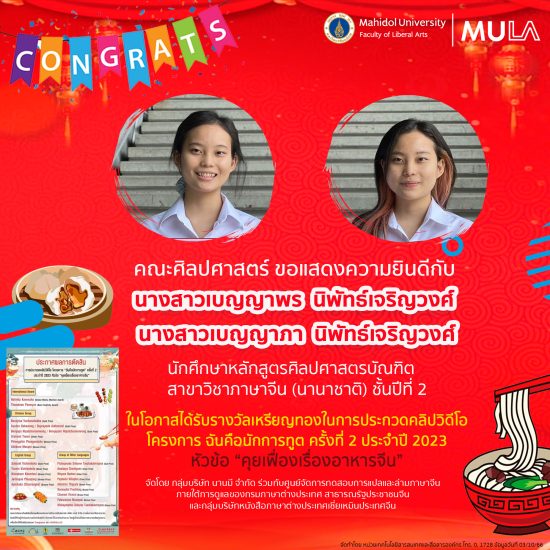
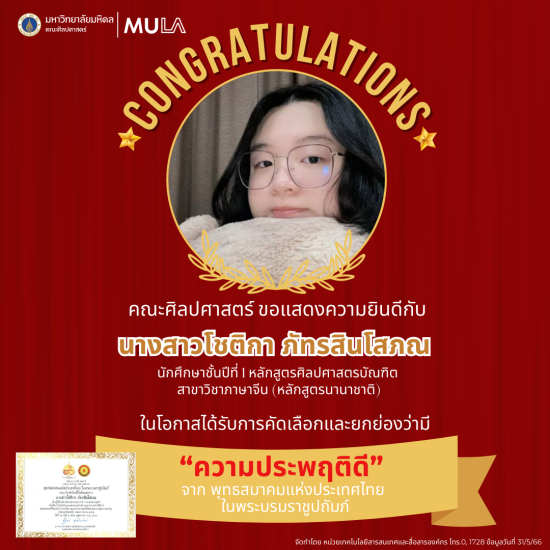
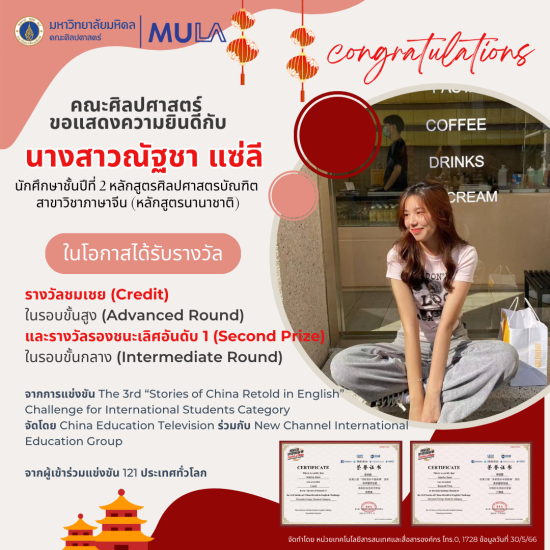
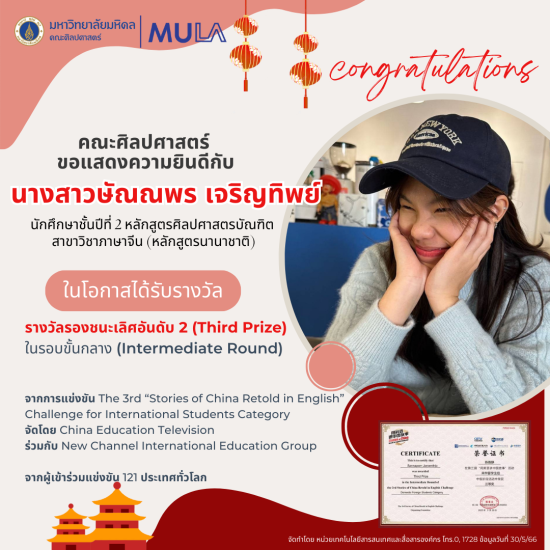
For Further Information
Academic Affairs
- Khun Somruetai, Khun Sangobsuk
- Tel: 02-441-4401-8, ext 1739, 1102


